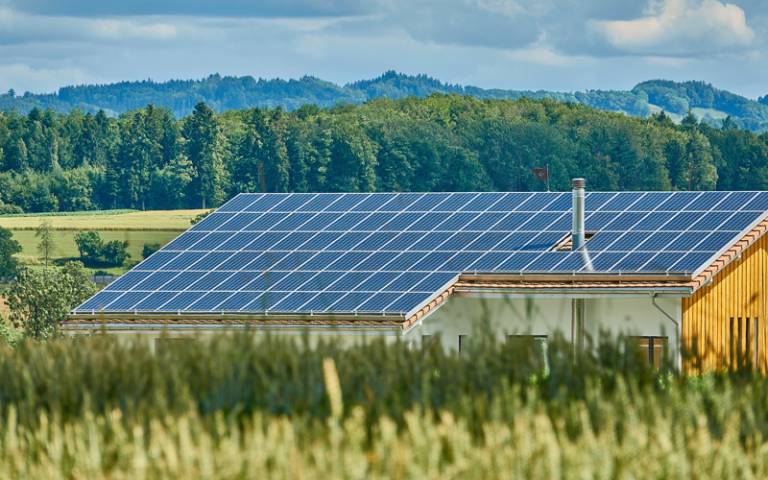New fully funded PhD studentship available in climate change mitigation through low-carbon heating
10 May 2019
This new studentship is part of the new EPSRC-SFI Centre for Doctoral Training in Energy Resilience and the Built Environment (ERBE CDT). It will be located at UCL's main campus in Bloomsbury, central London.

Supervisors
- Michelle Shipworth, UCL Energy Institute
- Dr Cliff Elwell, UCL Energy Institute
Context
To meet our commitments under the Climate Change Act, the UK needs to dramatically accelerate the move towards low carbon heating. To mitigate the additional strain on the energy network, heating needs to be more flexibly provided, including shifting or reducing heating demand. But heating demand is driven by humans driving technology. Consequently, this is a socio-technical challenge and requires interdisciplinary insights.
Background
Most Home Heating Controls require humans to communicate with them in technological terms - temperature, time and occasionally space. Although the purpose of this technology is to provide comfort to the occupants, we know very little about what thermal comfort means to householders, what sensations and preferences matter to them, the scope for gauging these subjectively and objectively, whether these can be communicated to heating controls, and whether they can be translated into heating system actions and/or communications with householders. This PhD will establish the groundwork for Human-centred Comfort Controls, designed for householders in relevant terms that are meaningful to them.
PhD project aims
The PhD research should build towards outputs that are actionable by the industry sponsor: What do householders want their heating system to do to meet their various needs? What are householder preferences for how their controls mediate between their needs and the constraints of the energy network? What forms of communication and dynamic feedback will enable householders to understand the actions taken by their heating controls and build trust that those actions correspond with their needs and preferences?
The research journey to these actionable outputs includes a depth investigation of the meaning(s) of thermal comfort to householders in the context of everyday home life, and how these meanings relate to key physical environmental variables, such as temperature, air flow rate and humidity in different spaces and at different times.
The student will explore the range of strategies householders use to manage their thermal comfort while engaged in other practices, including their engagement with heating controls. This will include an exploration of how the householder wants their heating controls to mediate between their thermal comfort preferences and the need to operate heating systems flexibly, supporting operation of a future low carbon energy system.
The research will explore how communications about and with the heating system are situated within everyday household practices and the modes, content and styles of communication compatible with these.
Industry Sponsor
PassivSystems provide a software platform for renewable asset management and for grid flexibility for domestic homes. They are at the forefront of research and early deployment of services offering flexibility while delivering increased comfort and convenience to the consumer.
Person specification
This is an interdisciplinary project; applicants with first degrees in social, natural or applied sciences are welcome. The successful candidate will be keen to develop a strong understanding of both the social and physical factors affecting thermal comfort. Applicants should have some ability to analyse physical phenomena combined with the capacity to engage with and apply social science theories that challenge standard definitions of thermal comfort.
Studentship details and eligibility
The studentship will cover UK/EU course fees and an enhanced tax-free stipend of approx. £18,000 per year for 4 years along with a substantial budget for research, travel, and centre activities. Applicants should meet the EPSRC eligibility criteria. The start date is September 2019.
How to apply
Please submit a pre-application by email to the UCL ERBE Centre Manager: bseer.erbecdt@ucl.ac.uk
The application should include the following:
- A covering letter clearly stating your motivation, and stating your understanding of eligibility according to these guidelines: https://www.epsrc.ac.uk/skills/students/help/eligibility/
- CV
- Names and addresses of two academic referees
- A copy of your degree certificate(s) and transcript(s) of degree(s)
Pre-application deadline: Tuesday 28 May 12:00 noon (UK time)
Interview date: 13 June
ERBE CDT
You will be undertaking this project in UCL at the main (Bloomsbury) campus as part of the new EPSRC-SFI Centre for Doctoral Training in Energy Resilience and the Built Environment (ERBE CDT). This is a collaboration between UCL, Loughborough University and Marine and Renewable Energy Ireland (MaREI). For more information, please visit the ERBE website.
Image by Roy Buri from Pixabay
 Close
Close

